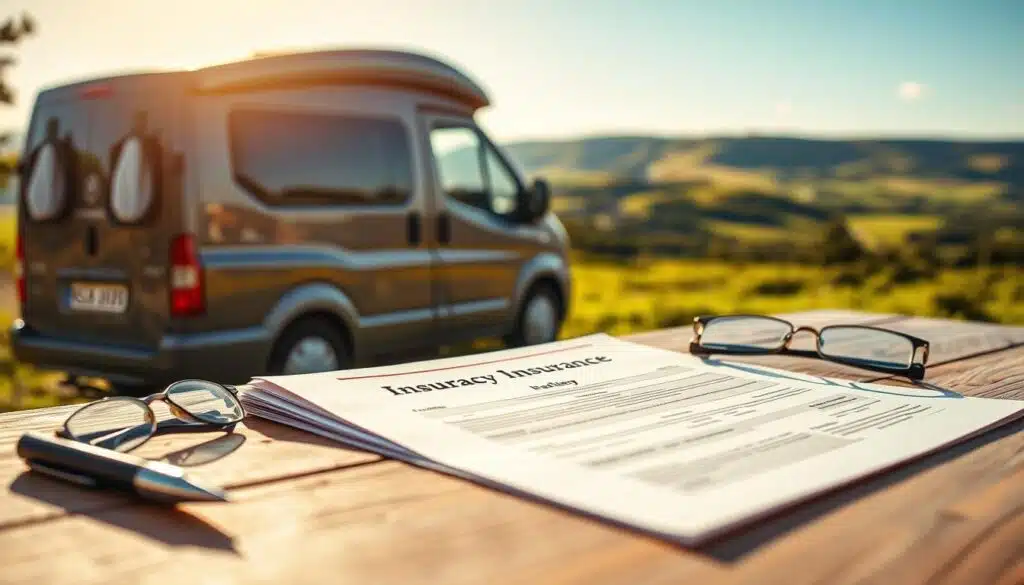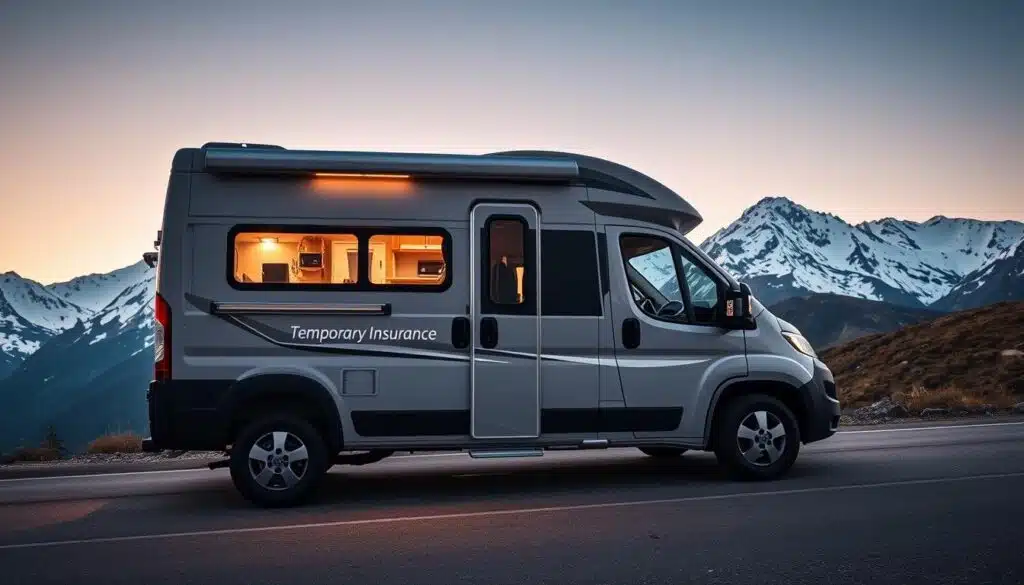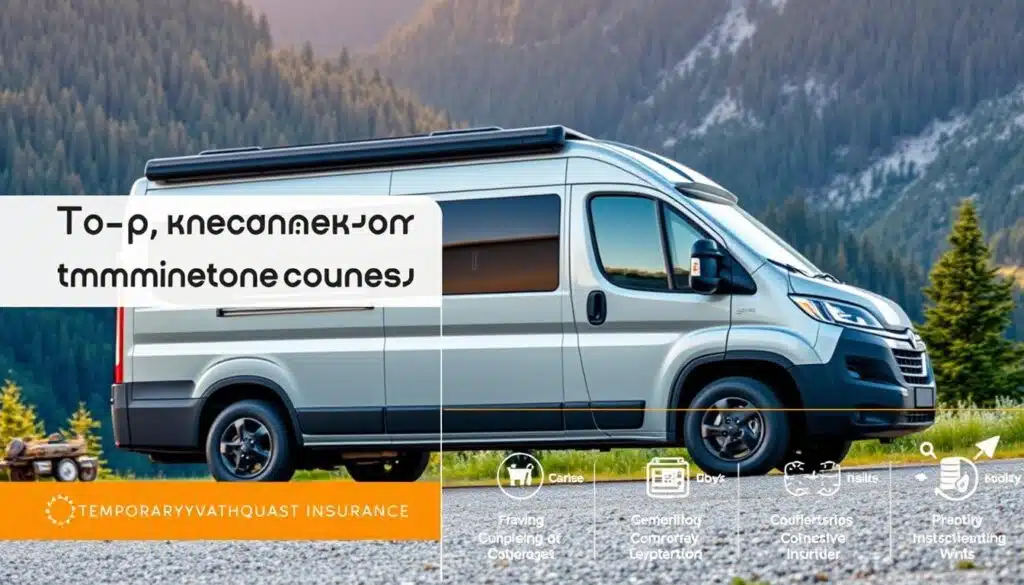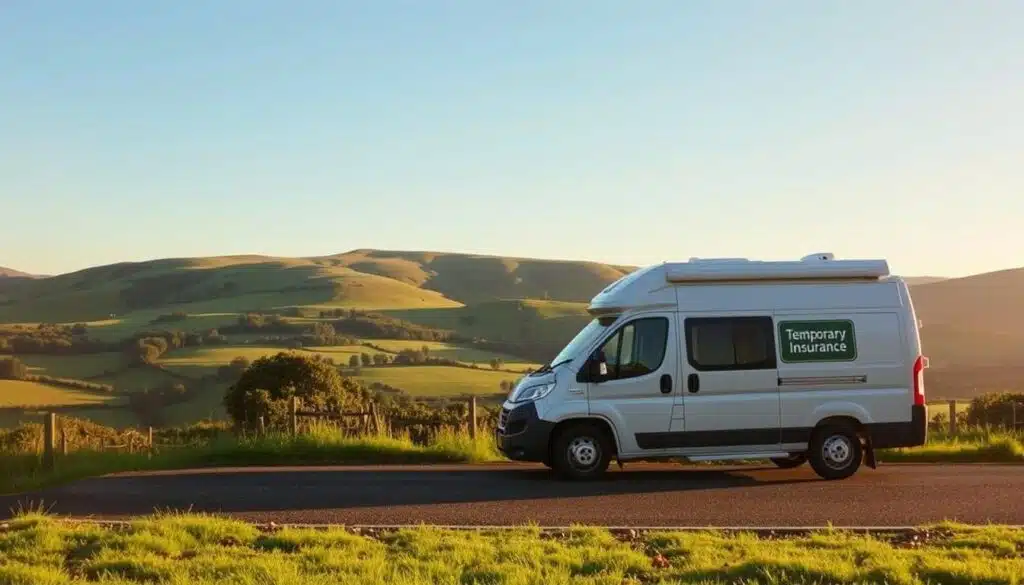Campervan travel is getting more popular. People are choosing it over crowded hotels for freedom and nature. They need insurance that fits their short trips and rentals.
Temporary campervan insurance is cheaper than yearly policies. It’s great for those who don’t drive much. It covers damage, liability, and personal items for short periods.
This guide uses 15 years of insurance knowledge. It talks about how prices work for temporary RV insurance. It also covers why prices change and new ways to get insurance.
You’ll learn about short-term vs. yearly plans. And about special insurance for motorhomes, caravans, and van conversions.
Table of Contents
ToggleKey Notes;
- Temporary campervan insurance offers flexible protection for short trips and rentals at lower cost than many annual plans.
- Short-term camper insurance can include liability, collision, contents, and emergency vacation expense cover.
- Pricing depends on vehicle type, driver history, trip length, and intended use such as rentals or festivals.
- New on-demand and platform-linked insurance models broaden choices for renters and owners.
- This guide compares options, lists top providers, and gives a simple buying checklist for instant coverage.
Why short-term coverage matters for campervan owners and renters
Short trips expose you to risks not covered by regular auto policies. A short-term camper insurance plan protects against accidents, theft, weather damage, and liability. It’s vital for trips that don’t fit into your annual policy.
Insurers see campervans and motorhomes as different from cars. Temporary campervan insurance covers gaps that standard auto insurance often misses. This includes rental use, commercial operations, or peer-to-peer hires on platforms like Outdoorsy and RVshare.
Risks for owners who skip temporary insurance
Allowing others to drive without the right endorsement can lead to huge legal bills. Accidents can cause over $2 million in damages. Lenders, campground operators, and state regulators may require specific insurance limits.
Damage during a rental often isn’t covered by an annual policy. Issues like wear and tear, rust, insect damage, and theft tied to certain activities are excluded. Owners using peer-to-peer platforms must check if platform protection applies or if they need a separate policy.
Cross-border travel adds complexity. Travel into Mexico or special U.S. liability zones may need separate coverage. Without the right paperwork, a simple trip can lead to denied claims and expensive legal issues.
When renters must buy temporary camper insurance
Rental companies and peer-to-peer platforms often require renter coverage. They might offer host-backed protection. Renters should check if their personal auto insurance covers a hired campervan. If not, they should buy temporary campervan insurance for liability, collision, and other losses.
Short hires benefit from one-week and multi-day policies. These match the rental term. A temporary rv insurance policy protects both renter and owner by covering damage and liability during the rental period.
Cross-border renters need extra caution. Trips into Mexico or long U.S. stretches may need higher liability limits or special endorsements. Compare temporary campervan insurance costs before booking.
temporary campervan insurance: overview of short-term and one-week options

Short trips need flexible insurance. For those on short trips, short-duration camper coverage is perfect. It’s for festival trips, weekend escapes, and more.
Types of short-duration camper coverage
Liability-only policies are the cheapest. They’re good for low-risk trips. Renters often pick this for its low cost.
Comprehensive and collision policies cover more. They’re for rented or valuable campervans. They protect against theft, vandalism, and weather damage.
Platform-linked policies work with Outdoorsy or RVshare. They let hosts keep their coverage. They also protect renters during trips.
Emergency and travel add-ons are available. They offer roadside help, lodging, and trip interruption. You can get them for a short time, not all year.
How temporary policies differ from annual policies
Short-term policies cost by the day or week. Annual policies have a flat fee. They often offer discounts for safe drivers and multiple vehicles.
Temporary policies have rules. They might not cover young drivers or those with claims history. Annual policies are more flexible.
Coverage and endorsements vary. Annual policies offer full replacement cost. Short-term policies have limits on personal items and replacement options.
Claims handling is different. Big companies like Progressive have 24/7 teams. Short-term insurers focus on quick online service.
Example: a seven-day policy for a festival trip. It should include liability, collision, roadside help, and emergency coverage. This mix protects you during busy travel times.
What temporary campervan insurance costs and pricing factors

Short-term insurance prices change with many factors. Expect different costs for liability-only versus full coverage. Companies like Progressive, Nationwide, and Good Sam have different rates based on risk, vehicle, and location.
Key pricing factors
The type and value of the vehicle affect prices. A fancy motorhome costs more than a small campervan or trailer. The year, make, and model also play a role in setting rates.
How you use the RV and where you go matters too. Traveling across borders, parking at festivals, or using it full-time increases costs. These activities cost more than just local trips.
Who drives the RV is very important. Age, driving record, claims history, and RV experience all matter. Insurers often charge more for young drivers or those with little experience.
What you choose to cover also changes the price. Liability-only is the cheapest. Adding more coverage like collision or roadside assistance increases the cost.
Where you live and how you store the RV also affect prices. Areas with high theft or extreme weather cost more. Units parked all the time might get discounts but might need extra coverage.
How long you need the policy and where you buy it also matter. Insurtechs offer one-day or one-week policies. Brokers might offer deals on short-term policies.
Typical price examples and estimates
A one-week liability-only policy usually costs a few hundred dollars. The exact cost depends on the driver and vehicle.
For a campervan, a one-week full coverage policy can cost from a few hundred to over $600. Motorhomes can cost more than $700 for a week, and over $1,000 for expensive ones.
Annual policies give a better idea of costs. Travel trailers usually cost around $600 a year. Motorhomes start at over $1,000 a year. Use these to estimate short-term costs.
There are ways to lower costs. Raising deductibles, bundling policies, joining RV clubs, and installing security can help. Taking driver training or agreeing to a credit check can also lower prices.
Prices can vary by state due to laws and credit rules. Shopping around, like with National General, Roamly, and others, shows big differences. Always ask for a detailed breakdown of what you’re paying for.
Top cheap and best temporary campervan insurance providers for 2025

The market for short-term cover grows with new rental platforms and seasonal travel. Choosing between providers calls for clear comparisons on price, features, and claims service. Below is a concise guide to leading names many owners and renters compare when hunting for the best temporary campervan insurance or cheap temporary campervan insurance.
Provider highlights and who each suits
Progressive: Offers strong RV products with options like disappearing deductibles and accident forgiveness. They also have add-ons for roof and pet injury. It’s great for owners who plan to use their campervan a lot and want long-term discounts and loyalty perks.
Nationwide: Has broad discount programs and optional towing, transport, and lodging benefits. They also offer good bundling options with auto and home policies. It’s ideal for drivers who want discount stacking and roadside/lodging protection.
National General: Focuses on newer models with purchase-price guarantees and storage-suspension features. It’s best for owners who want full replacement cost and the ability to pause coverage during storage.
Roamly: Designed for owners who rent through platforms like Outdoorsy or RVshare. It preserves coverage during rental periods and provides continuity when motorhome hire insurance is needed. It’s perfect for those who share their campervan frequently.
Good Sam (broker/aggregator): Works with Progressive, Foremost, Safeco, and National General. It simplifies comparison shopping and includes campground discount programs. It’s best for buyers who prefer agent help and multi-underwriter choices.
Independent brokers and local specialists: Firms like Acera Insurance offer tailored endorsements, emergency vacation expense coverage, and premises liability for long-term sites. They are recommended for full-timers or owners with complex exposures who need custom settlement options.
Real customer experience and service features
Claims service and digital tools shape real-world satisfaction. Many carriers provide 24/7 claims lines and online claims submission. Diminishing deductibles, storage discounts, and RV association savings appear often across the market.
Customer feedback shows mixed J.D. Power scores for some national carriers and above-average ratings for others. Online quoting varies by company; Progressive and Nationwide offer broad online tools, while some brokers require agent conversations for custom endorsements.
Regulatory complaints and availability differ by state. Some insurers restrict renting out an RV unless a specific endorsement exists or a rental-platform integration applies. Roamly leads on rental continuity, while National General stands out on replacement-cost features for newer units.
For shoppers focused on cheap temporary campervan insurance, compare daily and weekly pricing alongside key features such as liability limits, roadside benefits, and rental-permission language. Those who need motorhome hire insurance should confirm platform compatibility and uninterrupted coverage when a vehicle moves onto a rental marketplace.
Next step: request quotes from at least two temporary campervan insurance providers and ask about storage suspension, diminishing deductibles, and rental endorsements before you commit to a short-term policy.
Cheap temporary campervan insurance strategies for road trips, festivals and emergencies
Short trips need a solid protection plan. Choose coverage that fits the risk, trip length, and vehicle value. One-week camper insurance is great for weekend road trips. Short-duration camper coverage is best for trips that start and end on exact dates.
Only buy what you need. For safe, local drives, liability-only might be enough. But, if the campervan is expensive or you’ll drive through risky areas, get collision and comp.
Increasing your deductible can lower your premium. If you can handle small repairs yourself, it’s a good move. Bundling short-term endorsements with your auto or home policy can also save money. Check if your current policy can be extended for temporary needs.
Look for deals on platforms like Roamly, Outdoorsy, and Good Sam. Discounts for renters and owners, RV club memberships, and security devices can lower rates. Buy insurance only for the trip to avoid paying for unused days.
Consider the value of discounts versus claim support. The cheapest policy might lack important features like roadside help or quick claims service. For expensive campervans and motorhomes, cheap policies might not offer enough protection.
Traveling across borders or parking at festivals increases theft and liability risks. In these cases, a more extensive short-duration camper coverage is better. If you plan to rent out your campervan, you’ll need specialized coverage, not just basic liability.
Choose insurers with strong financial ratings for emergencies. If you need coverage fast, be ready for a higher premium. For a U.S. road trip, consider full coverage if your vehicle is worth over $25,000. For less expensive vehicles, liability with roadside support is enough.
| Scenario | Recommended Coverage | Why it fits |
|---|---|---|
| Weekend festival in urban area | Comprehensive + theft + emergency vacation expense | Higher theft and parking risk; protects belongings and recovery costs |
| One-week national park road trip | One-week camper insurance: collision + roadside assistance | Remote roads increase damage and towing likelihood; covers repairs and recovery |
| Short local trip with low-value camper | Liability-only + roadside assistance | Cost-effective for low exposure; keeps premium low while providing basic protection |
| Renting out vehicle through platform | Platform-backed temporary caravan insurance or rental continuity | Meets rental-use exclusions in cheap policies; ensures platform claims support |
| Cross-border drive into Canada or Mexico | Short-duration camper coverage with cross-border endorsement | Provides legal compliance and higher liability limits for international travel |
Temporary caravan insurance, motorhome hire insurance and temporary van insurance alternatives
Choosing short-term cover needs clear comparison. Towable caravans, rented motorhomes, and converted vans face different risks. Match policy type to usage, value, and travel location. This ensures no gaps in liability, contents, and replacement options.
How towable caravan policies differ
Towable units like travel trailers and caravans cost less to insure than motorhomes. They lack a powertrain, which lowers liability and mechanical risk. Policies cover specified perils, plus contents protection for campsite gear.
Some auto insurers extend trailer coverage to the towing vehicle. Check trailer length, weight limits, and if hired trailers get the same extension. Loss settlement may vary between actual cash value and full replacement cost. Newer caravans might qualify for guaranteed replacement early in the policy term.
Motorhome hire and rental platform coverage
Commercial rental firms offer collision waivers and loss-damage waivers. These may not include third-party liability. Renters should check if the CDW or LDW includes liability or if supplemental motorhome hire insurance is needed.
Peer-to-peer platforms like Outdoorsy and RVshare use host protection or require renters to buy short-term cover. Underwriters like Roamly let owners keep their underlying policy while providing rental continuity and guest-driver protection. Compare platform-provided cover to standalone short-term policies for cost and scope.
Temporary van conversion insurance issues
Converting a cargo van into a camper changes its classification and premium. Notify the insurer to avoid claim denial. Temporary van conversion insurance should list conversion features such as solar panels, fixed beds, and pop-tops.
Endorsements may cover aftermarket fixtures, roof racks, and personal belongings. Check if insurer accepts modifications and if limits exist for appliances or battery systems. Some carriers add surcharges for structural changes or limit payout on custom equipment.
Practical guidance and cross-border notes
Compare platform cover versus a dedicated short-term policy before booking. For trips into Mexico or Canada, secure a policy that explicitly covers cross-border travel. Many U.S. standard policies exclude Mexico unless you buy an add-on.
When a vehicle goes into long-term storage, ask about suspending collision or comprehsensive coverage to reduce premium. National General and similar carriers offer storage options that may cut costs without removing essential liability protection.
Add-ons, endorsements and essential coverages to consider
Short-term policies start simple. You can add extra protection for road trips, festivals, and rentals. Think about emergency travel help, extra liability when crossing borders, and coverage for items inside the vehicle.
Emergency and travel add-ons
An emergency travel add-on helps with lodging, transport, and meals if the campervan is lost. It’s great for festival-goers and families on tight itineraries.
Roadside assistance offers towing, flat repair, battery jump-starts, and lock service. Many insurers include this in an enhanced travel package. Personal property coverage protects your luggage and gear inside the van, though short-term policies often cap limits.
Choose specified perils for lower premiums on local trips. Select comprehensive for high-theft or severe-weather areas. Look for disappearing deductible and accident forgiveness features for repeat hires or rentals.
Cross-border and international travel endorsements
Cross-border RV insurance is key for trips to Mexico or Canada. U.S. policies often exclude Mexico, so buy a Mexican auto policy or brokered endorsement before leaving.
European travel cover (if applicable) is for owners shipping or driving units overseas. Confirm limits and buy a temporary cross-border extension when needed. Increase liability limits for high exposure trips; many experts recommend a $2 million benchmark for cross-border liability.
Owners listing vehicles on platforms like Outdoorsy should add rental or host endorsements. These endorsements let owners rent without voiding the primary policy. Platforms like Outdoorsy and RVshare also sell host protections that pair with insurer endorsements.
Watch common exclusions: wear and tear, mold, insect damage, and some natural catastrophes often fall outside short-term coverage. Long-term full replacement guarantees usually attach only to original owners and select model years; temporary caravan insurance rarely includes them.
| Add-on / Endorsement | What it covers | When to buy | Notes |
|---|---|---|---|
| Emergency travel add-on | Lodging, meals, transport after covered loss | Festival trips, multi-day road trips | Limits vary; verify per-day caps |
| Roadside assistance | Towing, jump-start, tire change, lockout | Remote routes or older vans | Often cheaper bundled with temporary campervan insurance |
| Personal property coverage | Belongings inside campervan | Trips with expensive gear or electronics | Short-term policies set lower limits than annual plans |
| Cross-border RV insurance | Liability and collision in foreign jurisdiction | Travel to Mexico, Canada, or Europe | U.S. policies may exclude Mexico; secure specialized policy |
| Rental/host endorsement | Protects owner while listing vehicle for hire | Owners using Outdoorsy, RVshare, or local rentals | Essential to avoid coverage gaps during rentals |
| Specified perils vs. comprehensive | Limited listed risks vs. broad protection | Low-risk short trips vs. high-risk areas | Comprehensive recommended for theft or storm exposure |
New tech options, such as pay-per-mile or usage-based insurance, appear for RVs in limited markets. Low-mileage short-term users may save with these products. Ask insurers about availability when you request quotes for temporary caravan insurance or temporary campervan insurance.
How to get temporary campervan insurance instantly online and buying checklist
Finding short-term campervan insurance should be easy and quick. Use online platforms to compare and buy insurance. Sites like Outdoorsy and RVshare offer instant insurance for rentals.
What insurers will ask for
- Vehicle details: VIN, year, make, model, conversion notes and estimated value.
- Usage details: trip dates, mileage, route, and cross-border plans.
- Driver information: names, ages, license numbers, and driving history.
- Existing insurance: current declarations page or proof of ownership.
- Security features: alarm, GPS tracker, or wheel locks that can lower premiums.
Temporary RV insurance purchase checklist
- Confirm coverage scope: liability limits, collision, and personal effects protection.
- Verify rental and platform use coverage when renting out or renting in.
- Check exclusions: Mexico travel, certain water damage, wear and tear, and theft waiting periods.
- Review claims access: 24/7 claims line, online filing, and average settlement time.
- Decide on loss settlement: actual cash value, replacement cost, or guaranteed purchase price for new units.
- Compare at least three providers or aggregators and ask about short-term discounts and promos.
- Keep policy ID and proof of insurance accessible on phone and print for border or rental checkpoints.
- Document vehicle condition with photos and an inventory of personal items before the trip.
Practical steps to buy instantly: gather VIN, registration, driver license photos, and trip itinerary. Start a comparison on an aggregator or contact an independent broker. Pick limits and add-ons such as roadside or emergency vacation expense. Purchase coverage for exact dates and save the confirmation and digital ID for quick access. If you need to buy temporary campervan insurance right away, aim to buy online through an insurer or marketplace that issues e-documents instantly.
Conclusion
Temporary campervan insurance is perfect for short trips, rentals, and emergencies. It’s different from yearly plans in many ways. So, it’s smart to compare different options instead of just sticking with what you have.
The cost depends on the vehicle, the driver, how you plan to use it, the coverage you want, and where you are. Use travel trailer and motorhome costs to guess prices. Look for the best deals on camper insurance.
Progressive and Nationwide offer a lot of features. National General and Good Sam focus on RVs. Roamly and Outdoorsy help with rentals.
Don’t forget to add extras like roadside help, emergency costs, and personal property coverage. Get quotes from at least three places. Make sure you have all the right documents ready.
Remember to buy coverage only for the exact dates you need it. Check what the rental platform needs if you’re renting out your campervan.
Market trends are moving towards on-demand and usage-based insurance. So, check your needs often. Use RV club discounts, safety courses, and security devices to save money. Always check state rules and carrier terms before buying.








